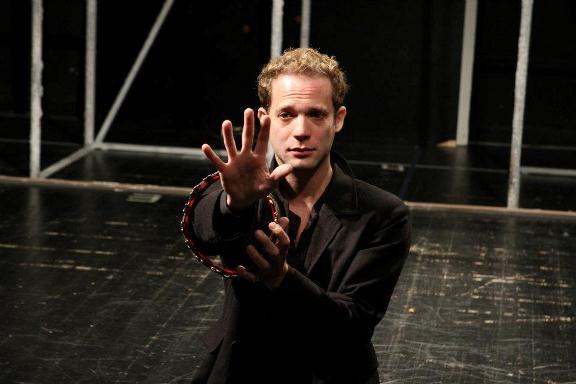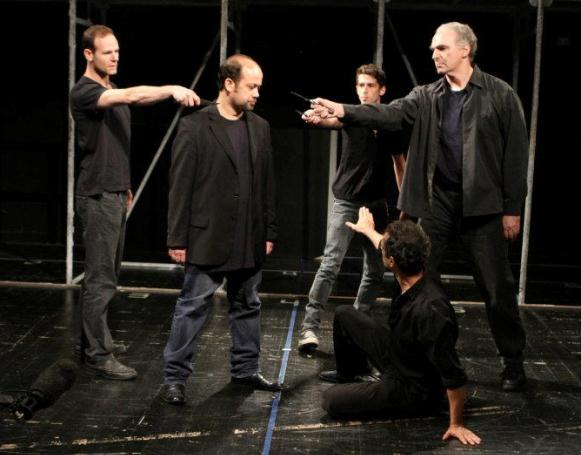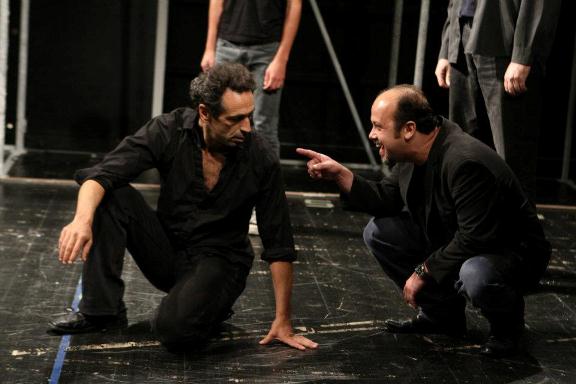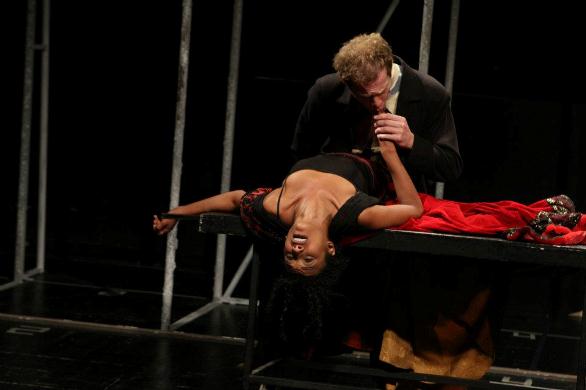Does your heart beat in iambic pentameter? The Cameri Theatre is all set to premiere Shakespeare’s Richard II and Richard III, both directed by Arthur Kogan, and featuring the same cast. The ambitious project was presented in a press meeting that took place in the rehearsal studio at the Cameri on Wednesday, June 27th, with a glimpse of select scenes and a lively discussion about the plays with the theatre’s artistic director Omri Nitzan, Arthur Kogan and the cast.

Working with a single cast and the same set, Kogan emphasizes the thematic link between these two history plays, raising questions of leadership, legitimacy and use of authority, loyalty and betrayal. Yet each play stands alone and they need not be seen in sequence. Richard II, written in 1595, takes a look at the fall of King Richard II of England (1377–1399) whose crown is usurped by a man who is perhaps more fit to lead, Bolingbrook (Gil Frank), with Itay Tiran playing the unfortunate king in this poetic tragedy. Richard III, written around 1592, deals with an entirely different sort of Richard, also played by Itay Tiran, the physically and morally impaired schemer who lies, connives and conspires his way to the throne, leaving a trail of dead bodies in his wake.
Among the scenes presented in the preview, was Act III, scene ii from Richard II, with one of my favorite speeches, revealing Richard in all his poetic, ineffectual glory:
Shakespeare was such a master poet that any non-English language production of his plays invites the question: will it work? As Itay Tiran demonstrated in the scene above, it can and it will work in Hebrew. This and other questions generated interesting conversations at the press meeting, with Omri Nitzan presenting the claim that birth contractions if amplified, would reveal themselves as iambic pentameter, Shakespeare’s meter of choice, so that the human pulse is attuned to Shakespeare from birth, in any language.
Itay Tiran pointed out that the average British youth whose native language is English, does not understand much of Shakespeare’s text, taking his argument further, claimed that it is likely that many audience members in Shakespeare’s own time did not understand all that was said onstage, for the simple reason that Shakespeare invented words and phrases, such as ‘breaking the ice,’ or ‘knock, knock, who’s there.’ For Tiran, one of the amazing things about Shakespeare, beyond the poetry, is that one does not need to understand every word in order to identify with what is happening onstage, to be swept away by an experience that transcends reality, a poetic experience leading to catharsis.
Tiran takes on quite a challenge with these dual roles, yet said that working on these two very different characters, the contrast between the two makes each a kind of negative image of the other, that in some ways working on one role helped him create the other by pulling the elements of the character in the opposite direction. Tiran said, “Richard II has a capacity for innocence, a lack of comprehension from one moment to the next, of the many blows that befall him one after another, utterly blind to his fate… Richard the III is a manipulative creature who knows himself inside and out, controls every secret of political scheming, and when you have such polar opposites, it’s very easy to know where you are, because you have the opposite coordinate,” concluding that the “schizophrenia” of working on two roles at once was actually helpful in this case.

The question of power and leadership in relation to ethics and ability is central to both plays, as neither Richard meets a particularly felicitous outcome, and generated in turn, an avid discussion. Director Arthur Kogan said, “Once you have tasted power, which is among the passions – food, sex, power, government – a person can’t give it up. There is no way back, it’s one way. You can see it in our politicians, by ‘our’ I mean in the world.”
Dudu Niv (York in Richard II, and Buckingham in Richard III) said, “In the context of talking about power, we too, not just political leaders, but for any person, it’s hard to conclude well or alive in this lifetime… the question is whether during our lifetime we are more or less ‘human,’ which path should we choose, and what intention underlies that choice of direction and I think that the two paths that we see in these two rulers – Richard II and Richard III – are completely different, with different intentions and different concept of what it means to be human and how one should behave.”

“There is another tragedy that we have not yet mentioned,” added Tiran, “the tragedy of Gil Frank (Bolingbrook) in Richard II, a ruler with good qualities, a moral ruler, who is thrust into a position of leadership in an illegal manner, but is a good man and a worthy king. An injustice has been done to him, the day of his crowning is a tragedy… there is something that Shakespeare deals with in both plays, this randomness, this unbearable lightness, that an idiot can sit on the throne, which often happens, and that people who are worthy are cast out. This unbearable lightness, this frivolity, where nothing is clear and the wheel of fortune turns and one day you’re on top and the wheel turns and the crown falls with you, and it can happen at any moment.”
In terms of the close relationship between power and corruption, Omri Nitzan spoke of the way in which Richard III keeps extending the boundaries of morality, saying, “He can start by killing a man, then killing his own brother, then killing two young boys who are also members of his family, and you see that one of the things that Shakespeare does is document the interior, sometimes all the information we receive about a person gives us only an external image, but he photographs the internal organs and he identifies an organ with which surgeons are unacquainted, and that is the conscience. He relates to the conscience, to morality, to that border that exists or does not exist, that may be far from you, the moral borderline and with Richard it’s very clear how that line is distorted…and that is an essential existential question in every system of rule. Just open the newspaper, it’s far more shallow…but the thoughts arise…”
For Kogan, this project has been many years in the making; he first contemplated the project over a decade ago, along with the late Gary Bilu, then Director of the Beit Zvi School of the Performing Arts. Although Kogan did direct both Richard II at Hasifriya Theatre in 2003, and Richard III in 2007, it is only with this production that the dream will be realized.

Looking at the two plays, Gil Alon (Bushy/Assistant gardener in Richard II, and Sir William Catesby in Richard III) said, “These two plays, so different from one another, one is so dramatic with a lot of blood on the stage and the other is so poetic, together they present a whole picture. That is, there is no middle ground; there are only the two extremes.”
“They form one large essay on government and leaders,” continued Itay Tiran, “the relationship between a ruler and his people, the ruler’s relationship with himself, Richard III can be seen as representing the effects of government, we see the action – how Richard hires a killer, how he uses the lobbyist Lord Buckingham to bring the Mayor and Church leaders to crown him, murders the two brothers – we see the action, how all this takes place. In Richard II we see a different process, like an X-ray or rather, a CT scan that delves far deeper into what takes place inside the mind of the ruler, what are his feelings, what are his psychological processes, and it’s a far more abstract play. Together, they create a whole.”
Eli Gornstein (Percy, Earl of Northumberland in Richard II, and Sir James Tyrrell in Richard III) commented that he does not necessarily view Richard III as a ‘bad’ person and Richard II as a ‘good’ one, “he thinks he’s the messiah, and he has a certain psychopathology because he thinks that God has blessed him, and this brings about suffering for the people around him. So there isn’t really ‘good’ or ‘bad’.”
To this, Kogan added his own qualification, “I have yet to find ‘good people’ in Shakespeare. Not a single character, I haven’t found one ‘good’ character in all Shakespeare’s works. He doesn’t write about ‘good’ people.”
Itay Tiran summed up the discussion, saying, “He writes about human beings.”
For information on dates, times and tickets, consult the Cameri Theatre website, or call: 03-6060960.
A selection from the conversation in Hebrew:





